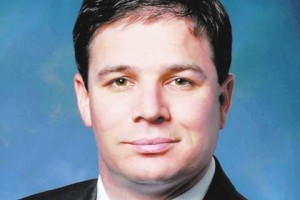Opponents of the Tohono O’odham casino in Glendale may have really stepped in it. According to the Arizona Republic, “lawyers and lobbyists representing the state and two  rival Indian communities held confidential meetings about ways to stop it, according to depositions released Wednesday.” However, if any minutes of those meetings were kept, they were subsequently destroyed. “They were of no further use,” a representative of the state argued lamely. No, documentation of a conspiracy to stop the tribe’s casino ambitions couldn’t possibly have any probative value in ongoing legal proceedings. The Tohono O’odham want Arizona Department of Gaming Director Daniel Bergin [right] sanctioned for sweeping the meetings under the rug. “If you have a duty to keep certain documents and you destroy them, then the judge could consider a … sanction,” argued Arizona First Amendment Coalition attorney Dan Barr — particularly when litigation is anticipation. At present, the State of Arizona and the tribe are deadlocked over whether the latter’s casino can offer Class III gaming — it presently has Class II machines and there’s nothing the state can do about it.
rival Indian communities held confidential meetings about ways to stop it, according to depositions released Wednesday.” However, if any minutes of those meetings were kept, they were subsequently destroyed. “They were of no further use,” a representative of the state argued lamely. No, documentation of a conspiracy to stop the tribe’s casino ambitions couldn’t possibly have any probative value in ongoing legal proceedings. The Tohono O’odham want Arizona Department of Gaming Director Daniel Bergin [right] sanctioned for sweeping the meetings under the rug. “If you have a duty to keep certain documents and you destroy them, then the judge could consider a … sanction,” argued Arizona First Amendment Coalition attorney Dan Barr — particularly when litigation is anticipation. At present, the State of Arizona and the tribe are deadlocked over whether the latter’s casino can offer Class III gaming — it presently has Class II machines and there’s nothing the state can do about it.
A state official pushed the Gila River Indian Community and Salt River Pima-Maricopa Indian Community under the bus, saying “the tribes seemed to be the most interested in keeping [the meetings] secret … A lot of what was being urged was clearly things that the Department of Gaming was not going to do.” However, the disputed meetings occurred after the Tohono O’odham had served notice that it intended to compel discovery of all documentation that could justify it receiving a full casino license. Gila River lobbyist Donald Pongrace is accused of urging the state to adopt dirty-tricks tactics on the Tohono O’odham, such as interdicting trash, electric and water services to to Desert Diamond Casino, essentially forcing it out of business. “I dismissed that out of hand, and I politely refused to discuss it, basically,” said Assistant Attorney General Roger Banan.
Instead, Banan had a ploy of his own. He would write letters saying “Department of Gaming considered the West Valley casino to be illegal … and that by doing business with an illegal casino, that the vendors could be placing their own state certificate in jeopardy.”  So one could make a prima facie case that the state and certain tribes were conspiring to forcibly close Desert Diamond. As U.S. District Judge David Campell wrote, “”The court also finds troubling the notion that a state regulatory body could join in a privilege-protected partnership with one of the entities it regulates to thwart expansion efforts of another entity it regulates, whether or not the regulatory body has a valid basis for opposing the expansion.” In a pay-no-attention-to-the-documents-behind-the-curtain move, Gila River spokesman Manuel Johnson said the revelation “seems like a desperate attempt to change the focus away from the fraud that Tohono O’odham committed, which if the issue of fraud is ever tried in a court of law Tohono O’odham knows they would likely lose.”
So one could make a prima facie case that the state and certain tribes were conspiring to forcibly close Desert Diamond. As U.S. District Judge David Campell wrote, “”The court also finds troubling the notion that a state regulatory body could join in a privilege-protected partnership with one of the entities it regulates to thwart expansion efforts of another entity it regulates, whether or not the regulatory body has a valid basis for opposing the expansion.” In a pay-no-attention-to-the-documents-behind-the-curtain move, Gila River spokesman Manuel Johnson said the revelation “seems like a desperate attempt to change the focus away from the fraud that Tohono O’odham committed, which if the issue of fraud is ever tried in a court of law Tohono O’odham knows they would likely lose.”
In their attempts to stamp out the Tohono O’odham, Arizona and its tribal allies have now grossly overreached. A stern punishment from the court system seems to be in order.
* American Gaming Association President Geoff Freeman is getting some empirical support for his crusade to rescind the Bradley Act and legalize sports betting on a wide basis. (It makes sense to us: It would be a treasure trove of “found money.”) Nielsen  surveyed 1,500 Americans, one-third of whom were “pre-qualified NFL bettors.” Those who wagered on NFL games watched 19% more of them than those who didn’t. And while they represent 25% of the NFL-viewing audience, they’re going to log 50% more time in from of the TV set than those who don’t wager. And the more betting that’s available, the more who would bet: 57 million, up from 40 million. It’s not just a football thing: March Madness spurs a 20% increase in viewership among those who have skin in the game. Freeman took the Nielsen ball and ran with it, saying, “The thought in passing PASPA in 1992 was that if we ban sports betting, we protect the integrity of the game. What we now know is that we have access to more data than ever before that can help us detect the bad behavior… and the public attitude toward gaming has improved. I’ve never been more confident that PASPA will be repealed and states will be empowered to regulate sports betting if they so choose.”
surveyed 1,500 Americans, one-third of whom were “pre-qualified NFL bettors.” Those who wagered on NFL games watched 19% more of them than those who didn’t. And while they represent 25% of the NFL-viewing audience, they’re going to log 50% more time in from of the TV set than those who don’t wager. And the more betting that’s available, the more who would bet: 57 million, up from 40 million. It’s not just a football thing: March Madness spurs a 20% increase in viewership among those who have skin in the game. Freeman took the Nielsen ball and ran with it, saying, “The thought in passing PASPA in 1992 was that if we ban sports betting, we protect the integrity of the game. What we now know is that we have access to more data than ever before that can help us detect the bad behavior… and the public attitude toward gaming has improved. I’ve never been more confident that PASPA will be repealed and states will be empowered to regulate sports betting if they so choose.”
As for daily fantasy sports in Nevada, Sheldon Adelson says he won’t have it in his casinos. However, USFantasy‘s Vic Salerno has secured walk-up DFS windows in Caesars Palace, Wynncore and unspecified MGM Resorts International properties. Unlike FanDuel and DraftKings, Salerno went about getting his Nevada DFS license the hard way, so we wish him success with his new outposts.
* If homelessness has been relatively out of sight in Las Vegas these past few months, it’s not out of mind. The Guardian investigated Sin City’s tunnel subculture and found full-time wage workers eking out a beggar’s existence. “They say there’s no better place to be homeless than the Strip. Tourists drop money on the ground. Gamblers give winnings away, or leave slot machines loaded with credits. Sometimes people nod off at gaming machines, allowing men … to withdraw cash vouchers on the sly.” You’d think people living such a fringe financial existence would know better than to gamble but you’d be wrong. One tunnel rat admitting to blowing his Social Security check on marijuana and slots. Some are homeless by choice. “I could get an apartment,. But all my money would go to rent, food, electricity, water … By the time I was done there’d be no money left over to do anything,” says John Aitcheson. Having been through a similar scenario when I first moved to Vegas, I don’t have overmuch sympathy for his choice.
Those who aren’t hooked on gambling are addicted to crack, meth or heroin, with each culture inhabiting its own territory within the tunnels. They’re willing to risk drowning in flash floods to maintain this lifestyle. HELP of Southern Nevada Behavioral Health Services Manager Frank Parenti cuts to the chase, saying, “It’s the underlining mental illness that has gone untreated that’s the real issue. There is a disproportionate number of mentally ill who are homeless, and addiction, as a co-occurring disorder, is a part of that. You have people that are using drugs to self-medicate.” Sheldon Adelson, if you and Miriam want to fight drug addiction in Nevada, why don’t you start underground?

